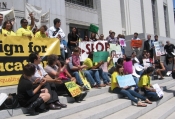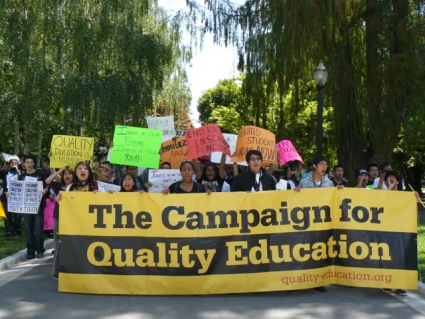 The California Court of Appeals in San Francisco will take up this very question when it hears oral arguments on January 27th in the twin cases Campaign for Quality Education (CQE) v. California and Robles-Wong v. California. At stake is the idea that the fundamental right to education in our state’s constitution means an education that provides students with the opportunity to achieve civic, economic and social success and to learn up to the state’s academic content standards.
The California Court of Appeals in San Francisco will take up this very question when it hears oral arguments on January 27th in the twin cases Campaign for Quality Education (CQE) v. California and Robles-Wong v. California. At stake is the idea that the fundamental right to education in our state’s constitution means an education that provides students with the opportunity to achieve civic, economic and social success and to learn up to the state’s academic content standards.
If such a robust right exists, then the schools must get the funds from the state that are necessary to provide students that level of educational quality. If the courts rule that right does not exist, then the state can act constitutionally as long as it keeps the school doors open for a set number of days a year, regardless of whether the students inside have a meaningful opportunity to learn anything.
The CQE case was filed more than five years ago by several grassroots organizations representing half a million families across the state and more than 20 individual student and parent plaintiffs. At the time, Arianna Antone Ramirez, a youth leader with plaintiff San Francisco Organizing Project, explained why a lawsuit was necessary:
“I deserve a quality education. All of the students of California deserve a quality education. My generation and I are the future of San Francisco, of California, and of the world. When I graduate from a university, I want to be a teacher. BUT when the Governor’s OWN Committee on Education Excellence concludes that the current finance system is ‘broken’ and as a consequence, it ‘does not ensure that sufficient resources reach students according to their needs,’ it sounds to me like the state has given up on me and my dream and the future of California.”

While much has changed in school finance since the case was filed, too much remains the same. Even if the governor’s proposed 2017-18 budget is adopted, our public schools will remain among the worst funded in the nation, and our children will continue to suffer for it.
One recent study of per pupil spending, adjusted for cost of living, has California pegged at 42nd in the nation — another has us at 46th. The Governor’s budget and the new Local Control Funding Formula (LCFF) only have us on track to return to pre-recession levels. The uncertainty over whether the revenue measures such as Proposition 30 will be extended and whether there will be a recession in the near future only further cloud hopes for a better day.
All this scarcity in funding translates to not enough adults to educate and support our students. California has the lowest staff-to-student ratio in the nation, taking together teachers, administrators, and support personnel like counselors, librarians and nurses. This picture will only get worse given the state’s failure to invest in long-term solutions to the teacher shortage. The latest round of state and national assessment scores for California showed that our state’s continued disinvestment in its students is perpetuating the same or even wider achievement gaps than were seen pre-LCFF reform.
The Court of Appeals has taken three long years to consider the critical issues raised in the CQE appeal. On January 27, we will get our first indication of whether California’s students — who represent 1 in every 8 students in the country — will be able to find the justice in our courts that the state has failed to provide them in their classrooms.
Read the CQE primer regarding the January 2016 California State Court of Appeals argument.

